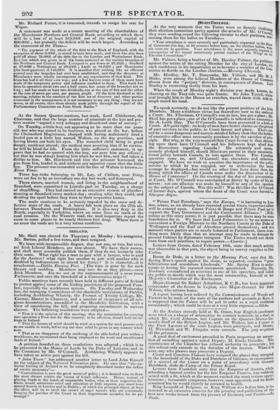To speak seriously, we do not like the present position
of the hid Members. Many a stubborn virtue has thawed ere now in the smilesof a Court. Mr. Fitzsimon, O'Connell's son.in.law, has got a place; Ms Sheil has got a place; one of the O'Connell's is talked of as successoito Sir A. Leith Hay. The O'Connells have been presented in abodyg Court. All quite right: no body of men have better claims on the growl of past services to the public, to Court favour and place. There can. not be a more dangerous and narrow-minded fallacy than that the holders of executive office must necessarily purchase it by the sacrifice of prin. ciple. But why, at the very moment:that Court favour is thus shows. ing upon them have O'Connell and his followers kept aloof from the discussions regarding Canada ? He solemnly and sponts. neously pledged himself, should Ministers persist in their unconstite. tional policy towards Canada, to vote against them. The Canadia question came on, and O'Connell was elsewhere and otherwia engaged. We have no wish to question the importance of the public service in which he was engaged, nor to undervalue the moral courage he displayed—but would no other time have done than that during which the affairs of Canada were under the discussion of the House of Commons? On the evening of the day of his presentation at Court, Mr. O'Connell was entertained at dinner by some of his ad. mirers : not one allusion was made by himself or any of the speakers to the subject of Canada. Was this well? Was this like the O'Connell of former days, against whom the doors of the Court were barred?...
Glasgow Argus.


























 Previous page
Previous page